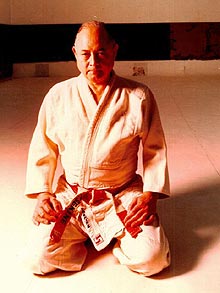 During
his time as a PoW in Germany he taught judo and ran
tournaments in between a number of attempts to escape.
Although very small and light, his technical brilliance,
speed and aggression enabled him to throw much larger
opponents, and he was never defeated in international
competition.
During
his time as a PoW in Germany he taught judo and ran
tournaments in between a number of attempts to escape.
Although very small and light, his technical brilliance,
speed and aggression enabled him to throw much larger
opponents, and he was never defeated in international
competition.
Percival Yasushi Sekine was born on February 20 1920 in London. His English mother worked in the Hatton Garden jewellery trade and his father, who was Japanese, worked for the Mitsui Bank.
Although Percy became a champion boxer at his school near Kings Cross, his father was keen for him to learn the Japanese art of judo. He took the boy to see his friend Gunji Koizumi, a dealer in oriental lacquer who had, in 1918, founded Britain's first martial arts club – the Budokwai – and subsequently introduced judo to Great Britain.
The young Sekine proved a quick learner and profited from having two excellent instructors: Koizumi himself was a fine judoka and his chief instructor was Yukio Tani. Tani had come over to Britain from Japan in 1900 to promote a ju-jitsu club by touring the music hall circuit where he accepted challenges from any member of the audience.
Although some well-known boxers, wrestlers, and formidable street fighters tried their luck, Tani beat them all and became a wealthy and celebrated figure. He was much admired by Bernard Shaw (who refers to him in his play Major Barbara).
By the time he was 19, Sekine had got his black belt, but further progress was interrupted by the outbreak of war. The Mitsui Bank was closed and Sekine senior found work as a dishwasher while his son served as an RAF wireless operator/air gunner in No 83 Squadron. On a mission over Holland, his Hampden bomber was shot down and he was to forced to bale out.
Captured and imprisoned in Stalag 383 in Bavaria, Sekine organised a judo club, negotiating with the guards for canvas and sacking to make a mat and jackets.
He was soon running regular training sessions and even an occasional tournament; but his wartime judo career was brought to an end when he was moved from the camp after an escape attempt. Indeed, he escaped three times in all (once "disguised" as a Japanese) only to be recaptured.
After the war he followed his mother's occupation as a diamond polisher in Hatton Garden, but the work soon palled and he became increasingly involved in judo as a teacher and competitor. He also pursued his other sports of table tennis and swimming.
He was invited to train the Royal Marines' first judo instructors and he represented Great Britain in international tournaments four times in the Forties and Fifties. These were the days when there were no weight categories, and although at nine and a half stone he was usually fighting people considerably bigger than himself, he was never beaten. After retiring from competition in the Sixties he was chosen to be the British team manager and became the first Briton to be appointed to the exalted rank of seventh Dan by judo's founding organisation, the Kodokan in Japan.
In 1947 he married Hana Koizumi, the daughter of the Budokwai founder, and in 1954 set up his own club, housed in two squash courts at the back of a block of flats in Hammersmith, west London. Under Sekine's aegis, the Judokan became a centre of excellence and produced several competitors who distinguished themselves on the growing international tournament circuit.
The club also attracted many children and adults from the locality as well as a colourful clientele from further afield – notably Richmond Golf Club, where Sekine played off a nine handicap. It was there that he encountered Tommy Cooper, whom he encouraged to come to the Judokan. David, Marquess of Queensberry, Eduardo Paolozzi, Stirling Moss and Jak, the Evening Standard cartoonist, were among the more serious regulars.
Sekine was an inspiring instructor, and although he never went to Japan until 1972 he passed on the classically pure Japanese approach to the martial art that he had learned from Koizumi and Tani. Even as an octogenarian, he continued to change into his white gi five evenings every week and go on to the mat to instruct students of all ages.
After the rigours of the training sessions, members would join him and his wife Hana at the little bar which was one of the more eccentric features of the club. There, over a large glass of Scotch, he would bemoan the "scrappy" techniques of the new generation of judoka, whose members lacked the skill and grace of the old masters.
The lease on the Judokan's premises expired in October 2004 and, faced with a substantial rent increase, the club was forced to close.
In February 2005 he was invited to the Tournoi de Paris, one of the main tournaments in the world judo calendar, and there joined a band of other surviving champions from the early days of contest judo to be honoured for their contribution to the sport.
Percy Sekine is survived by his wife and their son.